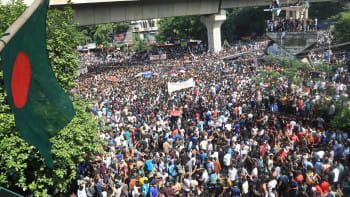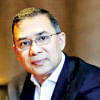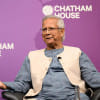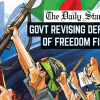Column by Mahfuz Anam: Two hours with the chief adviser

For me, it was after 12 years that I could get anywhere close to the highest seat of power, leave alone have an exchange of views. The former prime minister never allowed the largest circulated English daily of the country, its editor or any of its journalists access to the Prime Minister's Office (PMO) or to cover any event where she would be present. The reason I mention it is to point out that, by law, any position—except perhaps those devoted to national security—that is run using public money cannot be kept out of the process of accountability, including and especially that of the media. She broke the law by denying us access to the highest seat of governance. When former US President Donald Trump threw out CNN's White House correspondent because he loathed the news network, a federal court reinstated him in less than two weeks, saying no office run by taxpayers' money can be denied access to the media. But here she was, the "law" and the courts were at her beck and call. For us to go to the court would—as we thought, and our suspicion was justified by examples—have led to a judgment that would give a legal veneer to an illegal act. We were denied access for 12 years until the chief adviser (CA) of the interim government called us on Tuesday. The same fate was meted out to the highest circulated Bangla daily in the country, Prothom Alo. Our only crime was that we wanted to hold power to account.
Hopefully, that story has ended forever in Bangladesh, along with one-person rule, one-person bank loot, one-person-led loan default culture—who changed his looks and garb to pretend piety while looting the stock market, bond market, etc, and at the same time destroying financial discipline. Hopefully, we also have seen the end of abuse of power, cronyism, corruption, extrajudicial killings, and forced disappearances—an endless list of degeneration that 15 years of unaccounted for rule led us to.
Yesterday, we commemorated one month after the end of this repressive regime. It was a transformative moment when people from all walks of life spontaneously joined the students in a united struggle for freedom.
The two hours with the chief adviser, Prof Muhammad Yunus, began with a refreshing modesty. Instead of "I know everything, listen to me, wonder, and applause," he began by unhesitatingly sharing how onerous the tasks he faces are, how little time he has to accomplish it, how limited his own and his team's expertise is, and how desperately he needs the support of all people, and especially of the media. What a breath of fresh air it was—especially for those of us who tried our best to speak truth to power in the last 15 years—when Prof Yunus urged the editors to say, as loudly as possible, whenever we saw something wrong being committed by his cabinet. From a culture of "I cannot make any mistake because I love my people and Bangladesh always benefits when my party and I are in power," to an open and sincere invitation to criticise the government which—the CA understood and the former PM did not—would only help him achieve the goals that the people want him to. The modesty, the humility, the openness and, above all, the sincerity won our hearts and minds.
The most challenging task the CA sought our help in was to work towards unifying the nation. He felt, and we agreed, that today we stand dangerously divided, which must be ended as soon as possible. It is this division that gravely corroded all our previous attempts to take the country forward. He did not explain the issue in detail, and neither could we, but we all felt, intuitively and deeply, the centrality of that particular challenge.
There were talks about the reform of the constitution, especially devolving the unrestrained power that our constitution gave to the head of the government. There were talks of making the judiciary independent, empowering the Anti-Corruption Commission (which is described by one of its chairmen as a "toothless tiger"), human rights and all other statutory bodies powerful and independent enough to do their job. Special attention was focused on the Election Commission, whose repeated failure since 2014 crippled our representative government, debilitated our parliament, and made voters lose their faith in the "once in five years" prospect to have a say in choosing who should govern them. The fact that none of our chief election commissioners, since 2008, had the self-respect and dignity to resign when they discovered that the government of the day—having abolished the caretaker system—would not allow a free expression of the public will says it all about the moral bankruptcy of our select elite citizenry. To handle these legal but tricky questions, it was suggested that a special committee be formed—like the one headed by Dr Debapriya Bhattacharya to publish a white paper on the economy—to recommend a set of constitutional and other amendments of legal nature that would satisfy the need of time and give the CA a clearer notion about his programmes ahead.
The idea mooted by the information adviser of setting up an information commission received echoes in the discussion, with special mention of granting functional autonomy to the state-run Bangladesh Sangbad Sangstha (BSS), Bangladesh Television (BTV), and Bangladesh Betar so that public money is no longer wasted on propaganda for the government.
In his introductory remarks, Prof Yunus raised the question of the length of the interim government's tenure. He added that the political parties he had spoken with so far had given two broad views: "take as long as you need," and "take a reasonable amount of time" without defining what reasonable meant. Most of the editors responded by saying that the interim government should first set out its agenda and use that to determine the time it needed, and not go the other way of allowing the specificity of time to determine it agenda. The very few who gave any specific time frame, which varied between one and three years, added that the "honeymoon period" may not last for long, adding that much will depend on public perception of how effective, focused and pro-people programmes the interim government undertakes. The editors pointed out that a perception is gathering ground that all members of the interim government are not working effectively, actively, spiritedly, and creatively. They seem more desk-oriented than performance-driven. They don't give the impression that they are fully aware of the complexity of their tasks, and the enormity of public expectation on them. They are not visible.
As editors, we obviously focused a lot on the current harassment of journalists and strongly protested the recklessness with which media professionals were being charged with murder without a shred of evidence. This is giving a wrong signal to the media in the country and is damaging the image of the interim government to the world.
As for the relationship between the interim government and the media, it was a refreshing start after one and a half decades of abuse, harassment, baseless suspicion, and demonising. Regrettably, a section of our own community played an ignominious role, casting aside all ethics and norms of good journalism, thereby shaming all journalists.
There are two fundamental streams of work that the interim government needs to do: one is to run the everyday affairs of the government, and the other is to reform it. The first is itself a massive task that would occupy the full energy and resources of a full-fledged elected government in any country, made more so by the injustices, discrepancies, corruption and bad governance left behind by the ousted regime.
The second is the task to create for us a chance to build a better future. A one-minute pause by any of us would bring to our focus the tremendous challenge that the interim government faces.
Let us help them and give them time, patience, understanding and, most importantly, trust.
Mahfuz Anam is the editor and publisher of The Daily Star.
Views expressed in this article are the author's own.
Follow The Daily Star Opinion on Facebook for the latest opinions, commentaries and analyses by experts and professionals. To contribute your article or letter to The Daily Star Opinion, see our guidelines for submission.


 For all latest news, follow The Daily Star's Google News channel.
For all latest news, follow The Daily Star's Google News channel. 










Comments